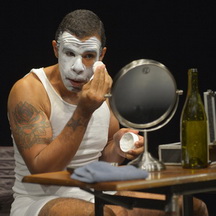What makes Caryl Churchill’s plays great is that they explain nothing. They present complex and even painful situations as matters of fact to be looked at and examined without the interference of an obvious agenda on the part of the playwright. Interpretation is left to the director, actors and audience. Exemplary of this approach to theater is Top Girls, which opened at A.C.T.’s Geary Theater this past weekend.
The play premiered in London in 1982, in the midst of Margaret Thatcher’s term as Prime Minister, during which the Conservative leader was responsible for the privatization of many of the UK’s social policies. To feminists she posed a problem. Even though Thatcher was the first woman to attain the leading political position in the UK, breaking through a glass ceiling in a country long committed to an old boy social and political system, her policies did little to serve women, especially working-class women.

Top Girls makes this contradiction the dilemma in the lives of women portrayed in the play. There are no men in Top Girls. But their presence is everywhere because what the women talk about is how they have overcome or managed to live the lives imposed upon them by societies dominated by men. The play shows women struggling with their fate as women.
The opening scene is set in a restaurant, where Marlene (Michelle Beck) is waiting for friends to help her celebrate her promotion to the managerial position at Top Girls Employment Agency. She has some surprising friends. Isabella Bird (Julia McNeal) and Lady Nijo (Monica Lin) to begin with. The first a Victorian Lady Traveller, the second a concubine of the 13th-century Emperor of Japan. They are followed by Dull Gret, the central figure in a painting by Pieter Bruegel. Dressed in helmet and chest armor with a copious apron filled with valuables, she is portrayed by the Flemish painter as leading a group of women, striding toward the mouth of Hell, surrounded by Bosch-like demons. Dull Gret doesn’t have a lot to say, but Pope Joan (Rosie Hallett) does. The 9th-century prelate enjoyed her rule disguised as a man until the unforeseen birth of her child in the midst of a religious procession led to her stoning. As she comments, “I was a heresy.”
All of these women suffer until they step out of their role as submissive women, but doing so has consequences. They are exiled by their communities, take on the role of cruel commanders or are killed.
It is Marlene’s last guest that most thoroughly realizes the social norm of women, Patient Griselda (Monique Hafen Adams), a character found in Boccaccio, Chaucer and Petrarch. A poor girl who marries a nobleman she is told that to preserve her marriage she must always obey her husband. To test her obedience, he asks her to give up her two children to be killed, to return to her parents with nothing except a thin slip, to decorate the hall for his marriage to a new wife and finally to meet that wife-to-be at the wedding. She does all of this. And she is repaid by finding out that the young wife and her brother are actually her children. That these sacrifices have simply been tests of her obedience and nothing more. That now she and her husband can live together in joy and peace.
Naturally, she forgives him. After all, he was suffering from fear of her lack of compliance. The other women greet her story with brooding silence.
From this dream-like scene the audience is catapulted to an everyday contemporary scene where two adolescent girls, Angie (Gabriella Momah) and Kitty (Lily D. Harris), are playing and quarreling, and from there to the Top Girls Employment Agency where Marlene and two female colleagues are interviewing women in search of jobs. All of these women are modern day analogues to the women we met at the dinner party.
The play’s final scene is set a year earlier in the home of Marlene’s sister, Joyce (Nafeesa Monroe). Here at last we have some insight into Marlene – her past, and her motivations, as well as the meaning of the opening scene. There is even a sequence where Marlene and Joyce argue about Thatcher. Marlene supporting the PM’s rise to power and endorsing her opinions about the working class, and Joyce condemning the self-seeking ends of Conservative politicians that ignore and ultimately abuse working-class women like herself.
It’s a rich play, undated by the passage of time or changes in social concerns. The directing is by Tamilla Woodard. No easy feat for either director or actors, for Churchill’s script demands a continuous dialogue in which character interrupt, chime in and carry on in a layered and brilliantly choreographed series of exchanges. This is a play well worth seeing, mulling over and talking about in a world that hasn’t changed that much. Scenic designer was Nina Ball, costumes by Sarita Fellows, lighting by Barbara Samuels. And crucially, Christine Adair was the voice and dialect coach.
– Jaime Robles
A.C.T.’s production of Caryl Churchill’s Top Girls continues at the Geary Theater through October 13. For tickets and information, visit act-sf.org.
